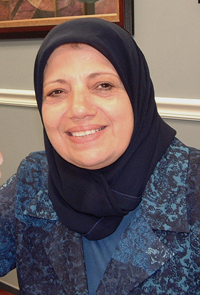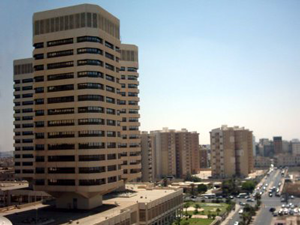El-Figi proud of the academic achievements of her children
August 17, 2009

Kheiria El-Figi
Murphy Brown was still on TV and Bill Clinton was campaigning for the White House when Dr. Kheiria El-Figi last set foot on the USC Campus.
That was 17 years and many adventures ago for the Libyan scientist who returned to Columbia with her family this summer for a brief sabbatical at the Arnold School of Public Health Department of Environmental Health Sciences.
“I could have gone anywhere in the world for my sabbatical but I chose to come to USC – where I feel at home,” El-Figi said, smiling.
For seven years, Columbia was home in fact to El-Figi and her late husband Dr. Omar Shegewi while they both worked on doctorates at USC.
The couple had just earned master’ degrees from Atlanta’s Emory University in 1985 and moved to an apartment near the VA Hospital, so that El-Figi could attend her comprehensive medical microbiology courses at the USC Medical School.
It was a busy time for El-Figi, rearing an expanding family and studying for her doctorate in medical microbiology.
She completed her PhD in 1990, an event marked by a research project in Microbiologic and Epidemiologic evaluation of Bacterial and Viral waterborne diseases, with implications for residents of South Carolina’s coastal counties.


Libya is a land of contrasts from downtown
Tripoli to the southern deserts.
Under the direction of her friend and mentor, Professor Geoff Scott, she studied the effects of waterborne bacteria from septic tanks on coastal residents who drank water from shallow wells.
Her study found cases of bacterial and viral illnesses in more than 500 persons with septic tanks and private wells compared to residents served by a central sewer system and a public water supply.
At the same time, Shegewi worked on his doctorate from USC’s Earth Sciences and Resources Institute, specializing in petroleum exploration. Even before he began his studies in the U.S., Shegewi was recognized as a distinguished petroleum geologist who mapped the oil rich basins off the shore of his native land.
In 1992, El-Figi finished her post doctoral degree in medical microbiology and then was offered an opportunity to continue her career at USC, but she opted instead to return to Libya with her husband who joined an international petroleum company to help develop the Libyan oil fields.
It was a tough decision for El-Figi and her young family, but as a person of faith, she says she trusted in God to guide her decision. El-Figi’s family had grown to six persons when the time came for them to return to their home in Tripoli, Libya’s capital.
Three daughters, Maram, Manal and Manar, all born in Columbia, were now part of the clan, along with Mutaz, her oldest son and a thoroughly Americanized youth who had studied at Mill Creek Elementary, A. C. Moore Elementary and Hand Middle schools.
The migration to Tripoli began with high expectations, but for El-Figi the arrival soon turned into tragedy as Shegewi took ill and died in late 1993. He was 41 years old. El-Figi believes that various stresses that he faced took a toll on him, possibly hastening his death.
Suddenly a widow, El-Figi was left to “be both mother and father” to four youngsters in a culture where most widows live a cloistered and restricted life.
But the average Libyan woman doesn’t have a PhD from a U.S. university and El-Figi was able to find work in teaching and research at Al Fateh University, the largest and most important institute of higher education in Libya. She still works at the university as an assistant professor in the Department of Microbiology and Immunology.
Her university career has given her a lot of satisfaction, she says, but she is proudest of her role as a “mother and friend” to her children. Her dedication to her family even earned her a “Mother of the Year” recognition in Tripoli.
She says elder son Mutaz is interested in following his mother’s lead in attending graduate school at USC.
Eldest daughter, Maram, is studying medicine in Libya and middle daughter Manal is in engineering school. The youngest, Manar, has a scholarship to attend college in the United Kingdom in September.
During El-Figi’s short sabbatical she is working on the issues surrounding factors involved in biofilms associated bacterial infections and the association between biofilm formation and antibiotic resistant pathogens, “learning new molecular and confocal microscopy technologies that can be applied to this world-wide problem of increasing antibiotic resistance,” she said.
In addition to her friends Professor Geoff Scott and Dean Thomas Chandler, El-Figi is collaborating with Drs. Alan Decho and Sean Norman of ENHS and Janet Moore of the Center for Coastal Environmental Health and Biomolecular Research (CCEHBR) in Charleston.
Dr. El-Figi thanks El Fatah University and The General Peoples Committee for Higher Education in Libya, for giving her the opportunity and support to spend part of her sabbatical in the USA, as well as extending her great thanks to all colleagues and friends mentioned above at USC and the CCEHBR.



_01.jpg)
_02.jpg)